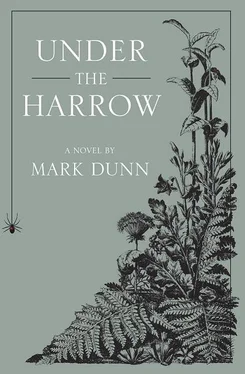Yet this is where Harry Scadger and his devoted wife Matilda and their three girls and two boys set up their new home, for they had no choice in the matter. Theirs was a building not much larger than the smallest of cottages in the Dinglian countryside, and where a wall or two of pasteboard had been thrown up, one could pretend the separation of rooms, though one could have just as easily strung curtains or erected tattered, moth-nibbled Japanese screens to achieve the same flimsy effect.
But to Harry and Matilda Scadger, a home was a home. And lodgings in the Pupker Mews were, at all events, more home than the couple and their children had ever known before. For every year that had preceded their present situation, the family had occupied mean and lowly domiciles that were little more than sleeping barracks of castoff plank and scavenged log. Everything that one did in a wakeful state was done out-of-doors and under sun, moon and stars, and even during eventide a drowsy Scadger might lie supine upon an old, frayed hearthrug or a soiled charity-bestowed counterpane, which served as crude floor mattress, and gaze through chinks in the ceiling at the night sky through the sort of rude skylight that required no glazing.
“What you see round you much improves upon our previous circumstances,” said Scadger, leading Timberry and me to his newly occupied dwelling. “Mind the rubbish,” he cautioned, stepping deftly over a dust pile near the front door. “They have not yet carted away the refuse from this long-vacant by-street. But I am told that it is to be done quite soon.”
The loud creak of the door, which did not hang easily upon its rusty hinges, proclaimed better than any bell or butler’s declaration our arrival, and in a trice, the three of us found ourselves in the company of four members of Harry Scadger’s young brood — two boys and two girls — each of whom either tugged upon the skirts of their father’s fustian waistcoat or pulled at his trowser pockets in want of something to eat.
The object of their quest lay within Scadger’s waistcoat pocket, and it was from this deep pouch that the man withdrew a paper of assorted nuts and currants “given to me by the kind charity woman who is overseeing our case.” This was said to Timberry and me to explain why such a poor man who was not a thief could be in possession of so much tasty treasure. The papa then commenced to passing a few tidbits to each of the children, who, in the manner of little baby birds, opened their beaks (whilst cupping their hands to give an alternate means of receipt). As Scadger was about the business of distributing the treats, his wife Matilda entered from the rear rooms, wiping her hands upon a flannel cleaning cloth.
“Good afternoon, gentlemen,” said she, dropping a small curtsey. “I didn’t know, my love,” this to her husband, “that we were to have guests to-day or I would have done a much better job of brightening up these dreary rooms.” Mrs. Scadger used the back of her hand to push a fallen lock of hair from her eyes. Her tresses were wilting in these stifling rooms, and perspiration beaded upon her flushed face.
“This isn’t a social call, per se, my love,” said the master of the house. “I have brought Dr. Timberry to see Florence.”
“A doctor ? You have brought a doctor here?” exclaimed Matilda, craning her neck to look behind us and out the door and into the lane.
“Right here and at your service, madam,” said Timberry, waving his hand as if he were hailing a hackney. “You may call me the boy physician, but I won’t mind it. Where’s the patient?”
“In the back room,” said Matilda, her face still registering some measure of confusion. Matilda led Timberry away as the father followed behind. I waited amongst the children who were gobbling their nuts and currants as if these were to be the only morsels they should eat this week.
As Scadger reached the door of communication between the rear rooms and the front parlour (if parlour it be; the room in which I stood was wanting of furniture save a wooden bench, a camp stool and a ricketty table and chair, where, one imagined, the family took turns eating each meal), he turned to beckon me to join him.
“Perhaps I should stop here,” said I.
“Nay, nay. You must see her. Florence has heard much about you and about your brother and your father. She wishes to be a writer like you. Have I not told you this?”
I shook my head. I could tell from the casual tone of Scadger’s voice and from the collected expression upon his face that he had heard of neither my nephew’s nor my brother’s departure from the Dell. How such a thing could be was not difficult to surmise: the Scadger orchard was an exclave, isolated like no other place in the Dell, save the coal-town of Blackheath. That which was known within an hour or two by nearly every other Dinglian, via the flash of the heliograph and the fleet-footedness of the ticket porter, sometimes took many additional hours or sometimes several days to reach the ears and ken of our valley outcasts. I would tell Scadger all of the news in time. For now, I did as my friend bade, and followed him— in silence — into the next room.
The oldest of the Scadger’s children lay propped upon a couple of pillows on one of a trio of small beds. The room was dark and smelt, as did every other room within the lodgings, of old mouldy hay and iron tools, and gave even a lingering hint of horseflesh. There was also the faint scent of apricot. Having lived amongst the fruit trees and having harvested their issue year after year before moving to the Mews, the Harry Scadgers — each member of this family, including the sick girl who lay before me — exuded the fruity scent as if it came directly from their pores, and its residue of sweetness did not offend.
With the sudden appearance of her father in the company of two men, one of whom she knew from my past visit to her former alfresco lodgings, Florence’s face brightened. Not only had the girl met me before, but had not Scadger spoken of me in my absence in complimentary terms? I took her hand. She smiled and put her other hand to her mouth to shield me from her latest croupy cough.
“Good afternoon, Florence,” said I.
“Good afternoon, Mr. Trimmers,” replied Florence after the cough had subsided, and with a blush that put some colour into her pale cheeks.
“And this is Dr. Timberry, dear,” said Mrs. Scadger to her daughter. “He is come to treat you.”
“Thanks in part to this syrup which your father has procured to ease your cough,” Timberry added, as he touched the thirteen-year-old girl gently and diagnostically upon the forehead.
How kind and modest Timberry presents himself to his patients, I thought to myself, humbleness being a credit to a physician. One cannot learn such a manner; it proceeds from one’s heart, and how that heart considers, as is its wont, the worth and feelings of others. I knew that there was something that I had always liked about this young man. Even as a boy, Mulberry had shewn a level of compassion and mercy that was striking for a child, sheltering all manner of injured animals, both feral and domestic, in his miniature veterinarial infirmary, and nursing a good many of them back to sound health. It was by Mulberry’s hand, as well, that the Judy puppet, which squawked when struck by Punch in each of his parents’ public puppet presentations, donned forever a fresh sanitary bandage upon the head so as to give one the sense that the battered Judy was forever on the mend.
Florence’s upturned eyes beheld her physician with obvious regard. He was a fine-looking man, whose darkly handsome features might appeal to a girl in the early blow of womanhood. After a brief interval, the patient returned her gaze to me. “Oh, Mr. Trimmers, I’ve read many of the things you’ve written, and I believe that you should write stories. I’m sure that they would be good ones.”
Читать дальше












